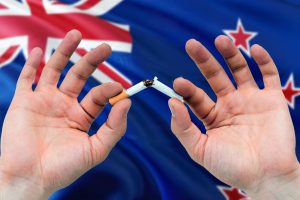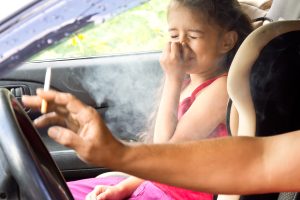 Nearly 85% of New Zealanders are smoke-free. But New Zealand is aiming even higher: The New Zealand Government has set the goal that by 2025 fewer than 5% of New Zealanders will be smokers. To this end, on 9th December 2022, Associate Minister of Health Dr Ayesha Verrall launched a new legislation, Auahi Kore Aotearoa Mahere Rautaki 2025, the Smokefree 2025 Action Plan. The plan includes measures that by the end of 2023 under 14-year-olds will not be able to legally purchase tobacco—and the age will rise each year so that younger generations will never have legal access to tobacco. The crackdown has been welcomed as a world-leading tobacco control measure. „This is a historic day for the health of our people,“ Dr Verrall said. „Smoking is still the leading cause of preventable death in New Zealand and causes one in four cancers.“
Nearly 85% of New Zealanders are smoke-free. But New Zealand is aiming even higher: The New Zealand Government has set the goal that by 2025 fewer than 5% of New Zealanders will be smokers. To this end, on 9th December 2022, Associate Minister of Health Dr Ayesha Verrall launched a new legislation, Auahi Kore Aotearoa Mahere Rautaki 2025, the Smokefree 2025 Action Plan. The plan includes measures that by the end of 2023 under 14-year-olds will not be able to legally purchase tobacco—and the age will rise each year so that younger generations will never have legal access to tobacco. The crackdown has been welcomed as a world-leading tobacco control measure. „This is a historic day for the health of our people,“ Dr Verrall said. „Smoking is still the leading cause of preventable death in New Zealand and causes one in four cancers.“
A bill is to be introduced in June 2023, meaning those aged 14 in 2023 will be banned from purchasing tobacco. The new laws will also mean only tobacco products containing very low level nicotine will be able to be sold. Dr Verrall also said: „Practical support measures for smokers are also being prioritised. We know it’s really tough to break the habit and some people who smoke will understandably need support leading up to these changes taking effect. Preventing people from starting smoking and helping those who smoke to quit means we are covering both ends of the spectrum”.
New Zealand’s anti-smoking laws go back a long way and can be regarded as exemplary for other countries. In 1990 the New Zealand Government introduced the Smoke-free Environment Act banning smoking in all indoor workplaces, schools and pre-schools. New Zealand was one of the first countries in the world to go smoke-free in the Indoor Hospitality Industry, when in 2004 further Legislation was passed (The Smoke-free Environments Amendment Act 2003) imposing smoking bans in public bars, restaurants, cafes, theatres, sports clubs, casinos, offices, factories, warehouses, work canteens halls, school buildings and grounds (including Early Childhood Centres) making these areas smoke-free zones. The Act also required the display of tobacco products in retail outlets to be restricted, and a ‘Smoking Kills’ sign to be erected near the display. Herbal smoking products were also included in this smoking ban. Also, access to smoking products for those under 18 years of age was further restricted.
In 2010 additional bans were imposed (Smoke-free Parks and Reserves ByLaw) banning smoking in all premier parks, play grounds and reserves. Just one year later, in 2011, the ‘Smoke-free Environments (Control and Enforcement) Amendment Bill became Law with the following restrictions:
- Tobacco retail displays were completely prohibited from July 2012.
- Tobacco sponsorship of events (eg: Fashion and Music Shows) was banned. This included exclusive distribution agreements with tobacco brands.
- Sale controls extended to internet sales. Internet sellers must not show images of packs or brands, must have the mandatory health warnings and must comply with the rules about retailer names not being permitted to promote tobacco names.
- Increased Taxes on Tobacco.
- Lower duty-free allowance for cigarettes.
- Support for Health Campaigns.
Smoke-free Enforcement Officers are able to issue instant infringement fines to those selling tobacco products to people under the age of 18. There are increased penalties for selling tobacco products to minors, from $2,000 to $5,000 for an individual and up to $10,000 for a business.
 From 28th November 2021 it became illegal to smoke in a vehicle carrying anyone under 18 years of age, whether the car was moving or stationary. Second-hand smoke is the smoke blown out and drifts off the end of a cigarette. When people smoke tobacco inside a car or house, everyone in the car or house are subject to breathing in this second-hand smoke. And, as mentioned above, New Zealand did not stop there, but with the newly launched legislation wants to make sure that young New Zealanders will not pick up the deadly habit of smoking.
From 28th November 2021 it became illegal to smoke in a vehicle carrying anyone under 18 years of age, whether the car was moving or stationary. Second-hand smoke is the smoke blown out and drifts off the end of a cigarette. When people smoke tobacco inside a car or house, everyone in the car or house are subject to breathing in this second-hand smoke. And, as mentioned above, New Zealand did not stop there, but with the newly launched legislation wants to make sure that young New Zealanders will not pick up the deadly habit of smoking.
Even though smoking each year still causes about 8.67 million deaths and 2 trillion US$ medical costs worldwide, many countries still hesitate to introduce strong legislation. The example of New Zealand shows the efficacy of step-by-step measures, and at least some countries seem to heed the call. For example, Mexico just recently tightened its ban on smoking in public places. Mexico’s legislation, which was first approved in 2021, is considered to be the most robust and wide-ranging in the Americas. Since 15th January, 2023, smoking is outright banned in all public spaces, including parks, beaches, hotels, offices and restaurants. There will also be a total ban on the advertising, promotion and sponsorship of tobacco products, meaning that cigarettes cannot even be on show inside shops. Furthermore, vapes and e-cigarettes are also subject to tighter new restrictions, particularly indoors.
As tobacco use is the single most preventable cause of death in the world, it is high time that more countries follow in the footsteps of New Zealand or Mexico!









